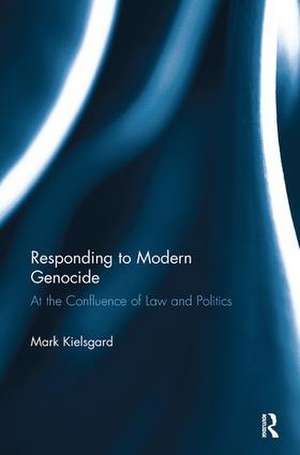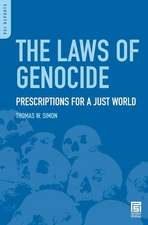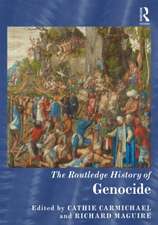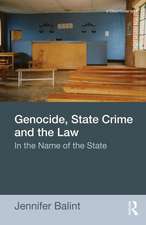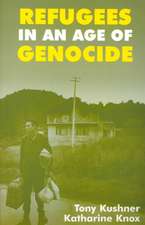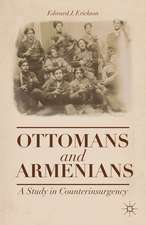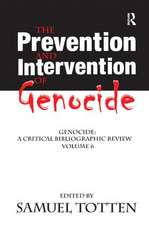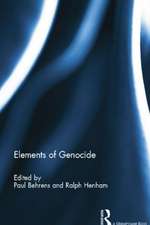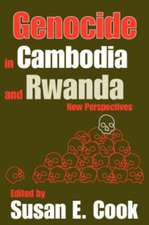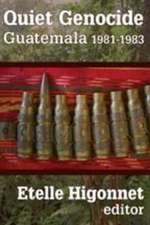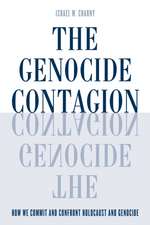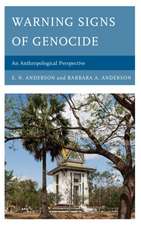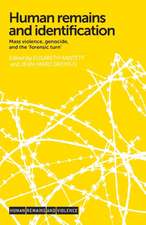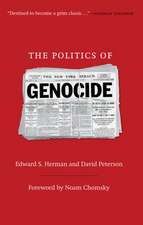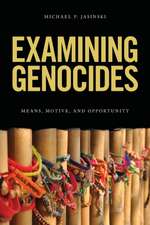Responding to Modern Genocide: At the Confluence of Law and Politics
Autor Mark D. Kielsgarden Limba Engleză Paperback – 21 dec 2017
As a work which provides a focused picture of those influences and their significance to genocide studies, this book will be of great use and interest to students and researchers in international criminal law, conflict studies, and conflict resolution.
| Toate formatele și edițiile | Preț | Express |
|---|---|---|
| Paperback (1) | 449.41 lei 6-8 săpt. | |
| Taylor & Francis – 21 dec 2017 | 449.41 lei 6-8 săpt. | |
| Hardback (1) | 1057.09 lei 6-8 săpt. | |
| Taylor & Francis – 25 aug 2015 | 1057.09 lei 6-8 săpt. |
Preț: 449.41 lei
Nou
Puncte Express: 674
Preț estimativ în valută:
85.100€ • 91.96$ • 71.70£
85.100€ • 91.96$ • 71.70£
Carte tipărită la comandă
Livrare economică 18 aprilie-02 mai
Preluare comenzi: 021 569.72.76
Specificații
ISBN-13: 9780815355328
ISBN-10: 0815355327
Pagini: 270
Dimensiuni: 156 x 234 x 15 mm
Greutate: 0.45 kg
Ediția:1
Editura: Taylor & Francis
Colecția Routledge
Locul publicării:Oxford, United Kingdom
ISBN-10: 0815355327
Pagini: 270
Dimensiuni: 156 x 234 x 15 mm
Greutate: 0.45 kg
Ediția:1
Editura: Taylor & Francis
Colecția Routledge
Locul publicării:Oxford, United Kingdom
Public țintă
PostgraduateCuprins
1. Introduction: Responding to Genocide 2. The Function of Prevention 3. The Cost of Denial 4. Restorative Justice: The Essential Healing Process 5. Punishing Genocide 6. "No Peace Without Justice" 7. Conclusion: Tracking Trends and Projecting an International Order of Human Dignity
Recenzii
"Kielsgard (City Univ. of Hong Kong) offers a compelling discussion of the role politics plays in the possibility of preventing genocide...The beginning traces the evolution of the law on genocide and the politics of its development. The second section of the book essentially discusses several theories of genocide highlighting the elements that lead to genocide. When these elements are identified, Kielsgard argues, prevention could be possible if the political will exists. The next section looks at how genocide denial affects the ability to prevent genocide because denial permits future crimes against marginalized groups. The final part of the book discusses transitional justice responses following genocide."
W. R. Pruitt, Virginia Wesleyan College, CHOICE
W. R. Pruitt, Virginia Wesleyan College, CHOICE
Descriere
This book analyzes incidences of genocide and mass atrocities, focusing on the political factors involved in modern counter-genocide efforts. Drawing on incidences of genocide and mass atrocity such as the Holocaust, the Rwandan genocide, and the Armenian genocide, Mark Kielsgard adopts a conceptual model that reveals the political factors which impact the international law of genocide, such as barriers and catalysts to transitional justice and the politics of genocide denial. Drawing on these examples, this work identifies issues and initiatives to provide an overview of the forces that shape genocide remediation and prevention.
